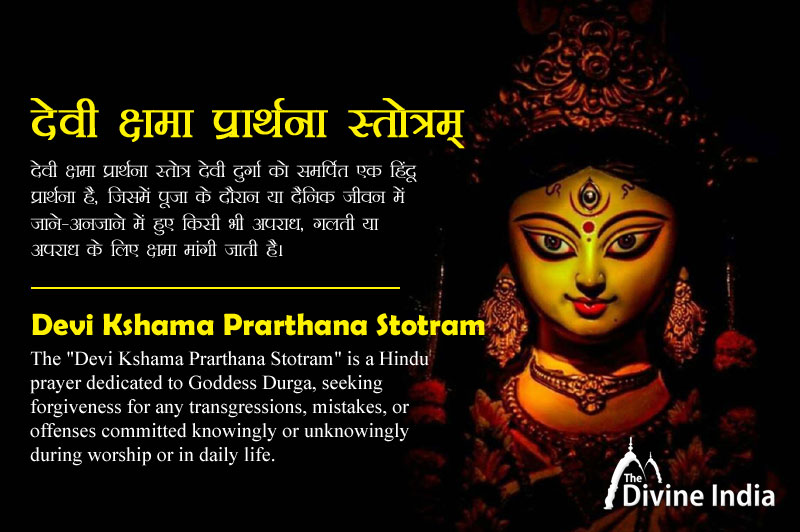


Aparādha sahasrāṇi kr̥ṣṇē āharnisaṁ māyā,
dāsō amithimāṁ mathva kṣamasva īśvari.1.
Āvajaṁ na jānāmi, na jānāmi visarjanam,
pūjāṁ caiva na jānāmi, kṣayathaṁ amarēśvarī.2.
Manthrahīnam, kriyāhīna, bhaktihīna, śrurēśvarī,
yataḥ pūjithaṁ māyā pūrṇa dēvī thādastuthē.3.
Āparādha sthaṁ kruthva jagadambēthi cō ucarataḥ,
yaṁ ganthiṁ sanvapnōthē na thaṁ brahmadāya surā.4.
Saparadhōsmi sarānā prathvaṁ jagadambikē,
idhanī manu kampyō̕haṁ yadēcchasi tadā kuru.5.
Ajñāna smr̥thērbranthya yan'yūna adhikaṁ kārthaṁ,
tataḥ sarva kṣayadhaṁ dēvī prasīdhī īśvari.6.
Ḵẖamēśvarī jaganmathi sacidananda vigrahē,
gr̥hanārcamīm prīthya prasīda īśvari.7.
Guhyadhi guhya gōptrī grahaṇa asmada kārthaṁ japaṁ,
sidhira bhavathu mēya dēvī thvat prasādataḥsurvēri.8.
The "Devi Kshama Prarthana Stotram" is a Hindu prayer dedicated to Goddess Durga, seeking forgiveness for any transgressions, mistakes, or offenses committed knowingly or unknowingly during worship or in daily life. The term "Kshama" means forgiveness, and this stotram is recited as an expression of remorse and a plea for the goddess's pardon.
Reciting the Devi Kshama Prarthana Stotram is a way for devotees to seek the goddess's benevolence, cleanse their souls, and rectify any unintentional faults. The goddess, in her boundless compassion, is believed to forgive the devotees and grant them her blessings.
This stotra is often a part of daily prayers and worship for those who venerate Goddess Durga. It helps devotees express their humility, devotion, and the desire for spiritual purification.
The stotra is typically recited in Sanskrit or Hindi, and it is recommended to understand its meaning to fully grasp its significance. Reciting it with sincerity and devotion is believed to bring about spiritual purification and divine blessings.